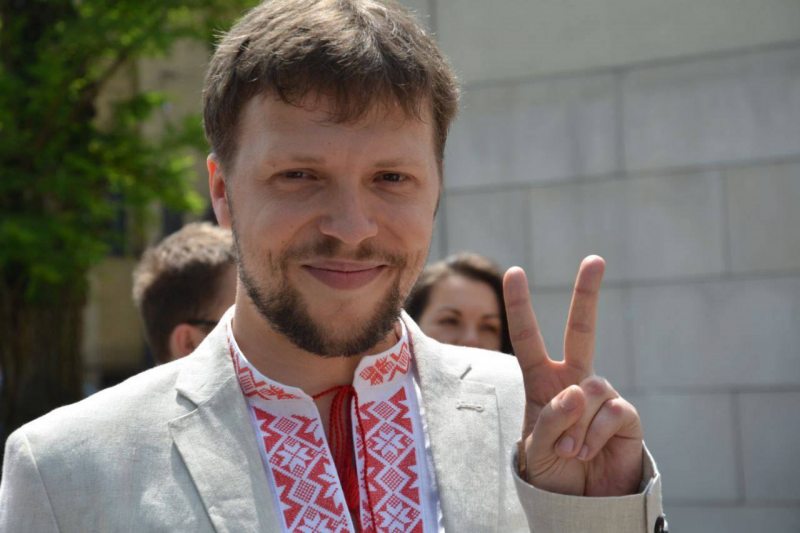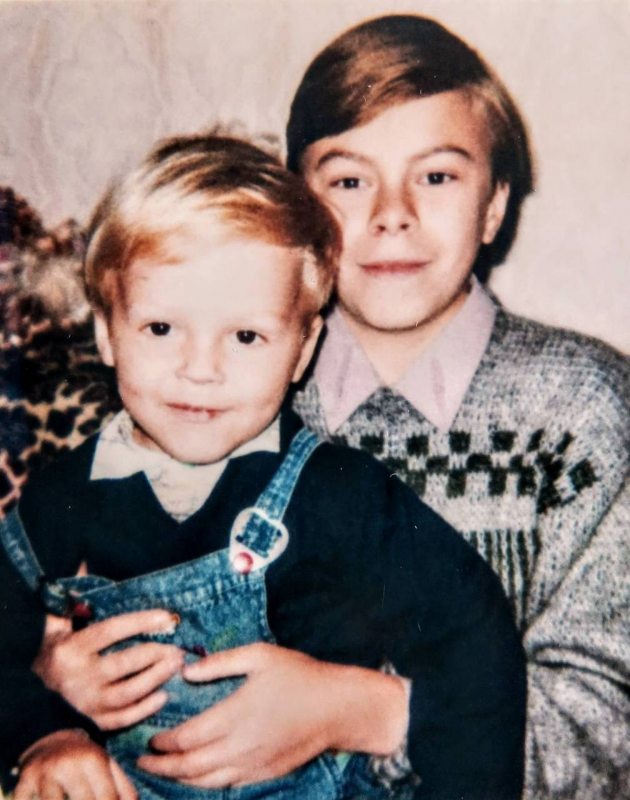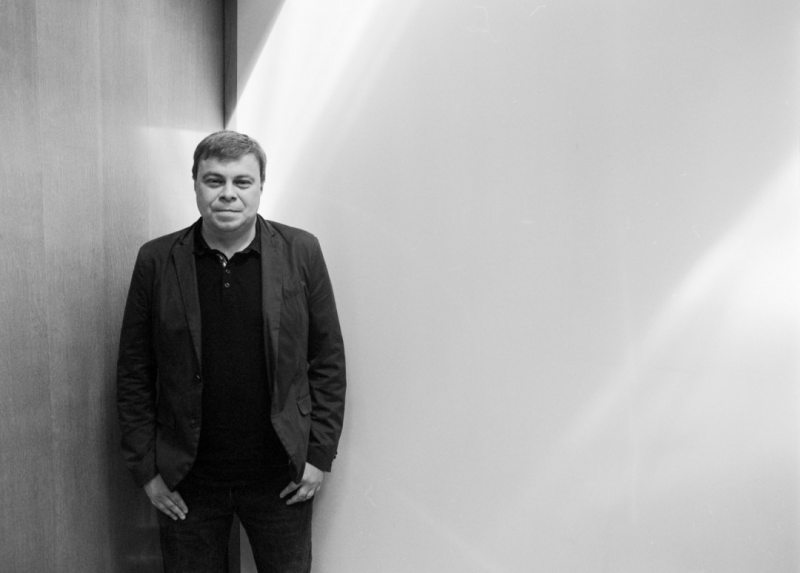"I could not imagine that when my elder brother got behind bars, someone would have to stand in for him," – says Mikalay Labkovich
The political prisoner Uladzimir Labkovich, a Viasna lawyer and the coordinator of the Human Rights Defenders for Free Elections campaign, has been kept imprisoned for a year and six weeks. The head of the organization Ales Bialiatski and his deputy Valiantsin Stefanovich have been behind bars for just as long. The investigation of the Viasna case has been extended again until October. After a year of imprisonment Uladzimir’s health has deteriorated badly; the human rights defender has been prevented from sending and receiving mail and has been held fully isolated. He has his 14-year-old daughter, 8-year-old twin sons, 69-year-old mother, and his wife, who is also a defendant in a criminal case, as well as his brother and his brother’s wife waiting for him at home. Mikalay Labkovich has told Viasna how he found out about the arrest of his brother and his brother’s wife on 14 July last year, how Uladzimir’s family has been living without him, and about the challenges they face and the way to help the imprisoned human rights defender and other political prisoners.

- Mikalay Labkovich
"I had a feeling as if they had decided to arrest everybody"
Mikalay Labkovich says that he found out about the arrest of his brother and his brother’s wife from Viasna Telegram channel. The human rights defender’s brother has described to us what he had to come through on 14 July 2021:
"We read that Uladz, Valiantsin and Ales were having their flats searched. Our thoughts at that moment were a mix of "What to do?" and "How to do it?" and "How to save them all at once?".
Our mother was at her summer house then, and I phoned her to say that she should be back immediately to take care of the children. Adelya, my brother’s elder daughter, took her younger brothers and they went to meet their granny. A couple of hours later, I phoned my mother and she said that she was at the DFR [Financial Investigation Department]. Back then, I had a feeling as if they had decided to arrest everybody to put Uladz under maximum pressure and to do harm to all family members. At that point, I was trying to figure out how to get the kids out to safety, what to do with them, how to apply for guardianship in the shortest term possible. I was in another country, and I had to consider a variety of steps to find a solution preventing the children from being taken to an orphanage.
During the two weeks while Nina was also kept in custody, we were pondering upon so many things. My wife and I had no plans about starting a family at that time, but it looked like we could have suddenly found ourselves in charge of three kids who were quite grown-up. It was a troubled period for both of us. You realize that Nina is arrested, Uladz is arrested, and your own mother seems missing (later it turned out that she was taking care packages to the DFR). The entire situation looked rather tangled and stressful."
"When interviewed by Radyio Svaboda last year, the human rights defenders made it unequivocally clear that "a hunting season had been declared open on them""
Nina was released after being held for 10 days at the Akrestsina temporary detention facility and at the pre-trial detention centre in Volodarskaga street. She remains a defendant in the Viasna case, but it is still unclear which articles she is being charged with.
"When Nina was released, we breathed a sigh of relief because it meant that the children would stay with their mother. There may be a variety of explanations why they let her go. When the archives are open for public, we will know the reason for sure."
The human rights defender’s brother admits that the family was not prepared for Uladz to be arrested, though they understood that that might happen.
"I am 31 already. I saw perfectly well how cruel the regime might be in 2010. At that time, with the tension growing, I kept thinking, "How much longer can this go on? How flexible and resilient one could be?". It turned out that there was no limit. The regime tightens all the screws. This becomes evident if you look at how they keep arresting people in Minsk. This a true concentration camp named Belorussia – there is no other way to put it. It is a concentration camp in the fullest sense of the word, where people are reduced to servile obedience and where no freethinking is allowed."
At the same time, Mikalay says that he had expected that sooner or later Uladz might become a political prisoner:
"I could imagine a situation like that, but I could not imagine that when my elder brother got behind bars, someone would have to stand in for him. This is more like a family issue and an issue of human rights protection, which is, unfortunately, not to be solved in Belarus.

- Mikalay (left) and Uladzimir (right) Labkovich. Mikalay is 2 years old, Uladz is 14
When interviewed by Radyio Svaboda last year, Uladz said that in the event of their arrest, there would appear other people ready to protect human rights, while the human rights defenders made it unequivocally clear that "a hunting season had been declared open on them". I realised that they might be arrested but I might have been naïve enough to hope that some of them could escape it. However, by now, no independent human rights organisations have been left in Belarus. As for the existing Legal Protection group, it has nothing to do with human rights advocacy."
"We think, they installed a bugging device there after 14 July"
Mikalay points out that after Uladz was detained, the life of their family has changed dramatically:
"When I left the country, I contacted my mother every day to have a chat. We talked about general things, the summer house, Uladz or the children. After his arrest, all we talk about is that letters don’t reach him, that his health is deteriorating, that he is having a hard time not seeing his children. Before all that happened, I communicated with Nina without reservation, but today we feel as if we were back in 1937, because you never know what topics are safe to discuss. The first question I always ask her is "Are you home now?". If she is not, I call her later. Even if she is at her place, there are still some doubts, because we think that they installed a bugging device there after 14 July. Or rather, it had been installed even before that. Another problem is that you never know the right questions to ask, with all this situation being so sensitive and painful for all family members. I make my questions sound as delicate as possible for fear of hurting her even more.
Day after day, my wife and I were thinking of ways to help. I borrowed a large sum of money to help my mother for a start."
"Uladz is in strict isolation"
Mikalay says, the family is under constant stress, especially when Nina is summoned for questioning.
"I remember how in December, Nina, after being interrogated, was taken home to have her place searched, and I was afraid she could end up being detained again. Thank God, she wasn’t."
Uladz’s brother says that correspondence with the human rights defender has been seriously hindered throughout his imprisonment term.
"Only three out of my 14 letters have reached him. The letters Uladz writes to his wife and to our mother are delivered in any random manner – they get delayed; they are numbered in a wrong way, with letter No. 71, for example, preceding letter No. 56; letters written in June came in August and letters for July, even later. Nobody knows why they need to break up correspondence like that. I know people whose letters have not reached him at all. It is unclear how the censors sort out these letters. Uladz is in a very strict isolation. I understand that they are doing it to put him under maximum pressure. There are no other "political" prisoners in his cell, no team-mates around, which creates an impression that all the others are fine and he is the only one in trouble."
"His sons are sorely lacking that intellectual backbone their father was for them"
The three children of Uladz Labkovich know that their father is imprisoned.
"His elder daughter Adelya, who is 14, has known about it from the very beginning, while his younger sons, who are 8, were told about his imprisonment a bit later. They all feel very worried. The children miss their father’s talking with them, reading them fairy tales; they are deeply attached to their father. Uladz had his own idea of a fairy tale for children, which was a great mix of the most famous children’s cartoons and fairy tales. Uladz is a very interesting man to talk to, and his sons are sorely lacking that intellectual backbone their father was for them. Nina is, by all means, a highly educated and intelligent person but it was easier for her when Uladz was around, sharing everything with him and discussing together all sorts of things with their children. Now, Nina has to be both a mother and a father. And this is a mission difficult to accomplish.
The children had a hard time celebrating his birthday – they wrote letters and made some gifts. While they enjoyed the process and had fun, it was evident that they felt very confused."
"During his imprisonment, his eyesight has deteriorated by two or three points"
Uladz has had his health seriously deteriorating in prison.
"Uladz does not consult the doctors at the detention centre; he just writes in his letters what he needs. The most recent requests were for glasses and medicines for headaches, because his eyesight has become much worse and that causes bad headaches.
His eyesight started failing before he was detained because of spending lots of hours at the computer, straining his eyes all the time and intensive reading. Now, it is becoming even worse. During his imprisonment, his eyesight has deteriorated by two or three points, although it is hard to be precise because no eyesight tests have been conducted", says the human rights defender’s brother.
"Keep writing letters – some of them may happen to reach the addressee"

- Uladzimir Labkovich
Mikalay Labkovich argues that it is necessary to keep writing letters to prisoners and to support their family members:
"Keep writing letters despite everything – some of them may happen to reach the addressee. If a letter is sent back, send it again and again until the addressee receives it. Viasna activists may obtain letters and small parcels. In addition to helping political prisoners, we should support their family members because they are in dire straits too.
For example, our 69-year-old mother gets a pension of 425 roubles – this money is not enough even for one person to live on. Besides, while she is trying to provide for herself, she scrapes up some stuff to send packages and parcels to Uladz."
Mikalay has also addressed the Belarusians who have stayed in Belarus:
"You should read and know about your civil rights and generally about human rights; you should understand how to protect yourselves. The imprisoned Viasna activists themselves said that it was necessary for others to take their place. As for the Legal Protection group, it has taken their place not to protect people but to create an illusion, to concoct a fictitious product just for show."
|
Support Uladzimir by writing to him: SIZO-1, 220030, Minsk, vulica Valadarskaha 2 (Belarus) |

















